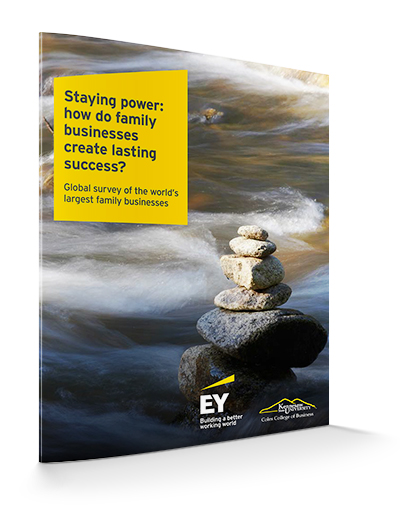Australian family businesses struggle with succession, cybersecurity
EXTRA >> CYBERSECURITY and succession planning are two of the main strategic deficiencies in Australian family businesses, a global business report by EY has flagged.
EY’s Oceania family business leader, Ian Burgess said the report was a warning that family businesses, as an essential source of prosperity and stability to both local and global economies, needed to ensure they were not “putting their heads in the sand” when it came to the two critical areas of succession planning and cybersecurity. 
“Australian family businesses have a generally positive outlook when it comes to business conditions, with over two-thirds believing that their markets will expand in 2015 and over half expecting to expand their workforce,” Mr Burgess said.
“While it’s heartening that Australian family businesses have a generally positive outlook, they’re behind on two key issues that they should be addressing to ensure their continued sustainability and growth into the next generation and beyond.”
The Staying power: how do family businesses create lasting success? report, launched by EY and Kennesaw State University’s Cox Family Enterprise Centre in June, surveyed 25 of the largest family-owned businesses in each of 21 global markets, including Australia.
ONLINE RISK
The report revealed Australian family businesses were lagging behind their global counterparts when it came to their awareness of cyber risk.
About 41 percent of Australian family businesses reported having no knowledge of the impact of cyber risk on their company – much higher than the global average of 25 percent.
Even Australian respondents who were aware of the risks were fairly evenly divided about the scale of its potential impact on their business, with 32 percent rating it as low and 27 percent rating it as medium to high.
Mr Burgess said in an increasingly connected, digital world, family businesses needed to place greater emphasis on their cyber security.
“Even with the near-constant news of cyber breaches, leaks and the resulting financial losses, Australian family businesses seem to be worryingly relaxed about the risk of cyber threats and potential impact on their business,” he said.
“By their nature, family businesses face some particular increased risks beyond the usual hacking and data breaches, such as social media risks, reputational risks and personal safety concerns. For this reason, cybersecurity should be at the top of the agenda for any family business.
“Around the world, there are thousands of cybersecurity breaches each year – it’s the new reality of doing business. The biggest hurdle to family businesses in this space is recognising the most critical threats and understanding how to address them,” Mr Burgess said.
“The good news is that, due to their concentrated ownership, once family businesses are aware of the risks they have the advantage of being able to make and implement decisions quickly. This allows them to put effective plans in place to help minimise cybersecurity risks.”
EY’s Asia-Pacific information security leader, Mike Trovato said learning to anticipate cyber-crime was critical when it came to organisations transforming themselves from easy targets for cybercriminals to more formidable adversaries.
“Too many organisations fall short of mastering the key components of cybersecurity,” Mr Trovato said. “Organisations lack focus at the top and the right procedures and practices to anticipate new threats. This is a major concern.”
WHO LEADS THE FUTURE?
EY’s Oceania leader for family office services, Richard Boyce said, with half of all the Australian family businesses surveyed still in the hands of the first generation, having a strong and clearly defined succession plan in place is essential to their continuing success
“Succession is arguably the most critical issue a family business has to face, yet it is often one of the most difficult to navigate,” Mr Boyce said. “Complicated family dynamics and the emotional connection that business leaders and family members feel towards their companies can make addressing the issue a potential minefield.
“Our survey found that Australian family businesses most commonly left succession planning in the hands of the CEO (42%), followed by owners or family council (32%). This is in contrast to the global results, where 44 percent of businesses surveyed said their board of directors had primary responsibility for succession planning.”
“If the intention is for the business to remain in family hands, succession must be considered a process, not an endpoint. It needs to be embedded into the day-to-day operations of the business, through training and education of the next generation.
“Succession is also about creating an enduring business model that can evolve and innovate, therefore the leadership required to be able to last through generational change is far more sophisticated and experienced than ever before.
“Family members must be willing to address the issue of succession planning head on through an open and ongoing dialogue. Getting this right will free up the CEO, board and council to focus on the wider business,” Mr Boyce said.
SHAPE OF FAMILY BUSINESS
The Staying power: how do family businesses create lasting success? Report also revealed a great deal about the shape of family business in Austalia.
About 50 percent of Australian family businesses currently have a first generation leader, 25 percent second generation, and 13 perent are led by third and fourth generations.
Australian family businesses rank lowest in terms of the number of countries they operate in, with an average of 2.3 compared to the global average of 15. In contrast, family businesses based in Germany operate in an average of 39.4 countries, Canada in 13.8 and China in 19.3.
About 90 percent of Australian family business respondents were satisfied with the performance of their board of directors, rating it as either good (60%) or excellent (30%).
Average return on equity for Australian family businesses is about 5 percent – on par with Spain and South Korea.
Corporate social responsibility and giving back to the community is important to Australian family businesses, with 73 percent engaged in philanthropic activities.
ends

